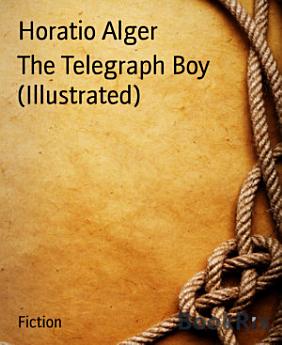关于此电子书
"I have two children," she said, "a daughter and a son. The son has recently graduated from college, and is now travelling in Europe. My daughter is now twenty-six years of age. She was beautiful, and our social position was such that my husband, who is a proud man, confidently anticipated that she would make a brilliant match. But at the age of nineteen Ellen fell in love with a clerk in my husband's employ. He was a young man of good appearance and character, and nothing could be said against him except that he was poor. This, however, was more than enough in Mr. Graham's eyes. When Lawrence Brent asked for the hand of our daughter, my husband drove him from the house with insult, and immediately discharged him from his employ. Ellen was high-spirited, and resented this treatment of the man she loved. He soon obtained a place quite as good as the one he had lost, and one day Ellen left the house and married him. She wrote to us, excusing her action, and I would gladly have forgiven her; but her father was obdurate. He forbade my mentioning her name to him, and from that day to this he has never referred to her.
In late-nineteenth-century New York City, fifteen-year-old Frank Kavanagh's job as messenger boy brings him many adventures, new friendships, and eventually a great improvement in his fortunes.
Horatio Alger, Jr. (January 13, 1832 – July 18, 1899) was a prolific 19th-century American author, best known for his many juvenile novels about impoverished boys and their rise from humble backgrounds to lives of middle-class security and comfort through hard work, determination, courage, and honesty. His writings were characterized by the "rags-to-riches" narrative, which had a formative effect on America during the Gilded Age. Alger's name is often invoked incorrectly as though he himself rose from rags to riches, but that arc applied to his characters, not to the author. Essentially, all of Alger's novels share the same theme: a young boy struggles through hard work to escape poverty. Critics, however, are quick to point out that it is not the hard work itself that rescues the boy from his fate, but rather some extraordinary act of bravery or honesty, which brings him into contact with a wealthy elder gentleman, who takes the boy in as a ward. The boy might return a large sum of money that was lost or rescue someone from an overturned carriage, bringing the boy—and his plight—to the attention of some wealthy individual. It has been suggested that this reflects Alger's own patronizing attitude to the boys he tried to help.
In late-nineteenth-century New York City, fifteen-year-old Frank Kavanagh's job as messenger boy brings him many adventures, new friendships, and eventually a great improvement in his fortunes.
Horatio Alger, Jr. (January 13, 1832 – July 18, 1899) was a prolific 19th-century American author, best known for his many juvenile novels about impoverished boys and their rise from humble backgrounds to lives of middle-class security and comfort through hard work, determination, courage, and honesty. His writings were characterized by the "rags-to-riches" narrative, which had a formative effect on America during the Gilded Age. Alger's name is often invoked incorrectly as though he himself rose from rags to riches, but that arc applied to his characters, not to the author. Essentially, all of Alger's novels share the same theme: a young boy struggles through hard work to escape poverty. Critics, however, are quick to point out that it is not the hard work itself that rescues the boy from his fate, but rather some extraordinary act of bravery or honesty, which brings him into contact with a wealthy elder gentleman, who takes the boy in as a ward. The boy might return a large sum of money that was lost or rescue someone from an overturned carriage, bringing the boy—and his plight—to the attention of some wealthy individual. It has been suggested that this reflects Alger's own patronizing attitude to the boys he tried to help.
为此电子书评分
欢迎向我们提供反馈意见。
如何阅读
智能手机和平板电脑
笔记本电脑和台式机
您可以使用计算机的网络浏览器聆听您在 Google Play 购买的有声读物。
电子阅读器和其他设备
如果要在 Kobo 电子阅读器等电子墨水屏设备上阅读,您需要下载一个文件,并将其传输到相应设备上。若要将文件传输到受支持的电子阅读器上,请按帮助中心内的详细说明操作。








